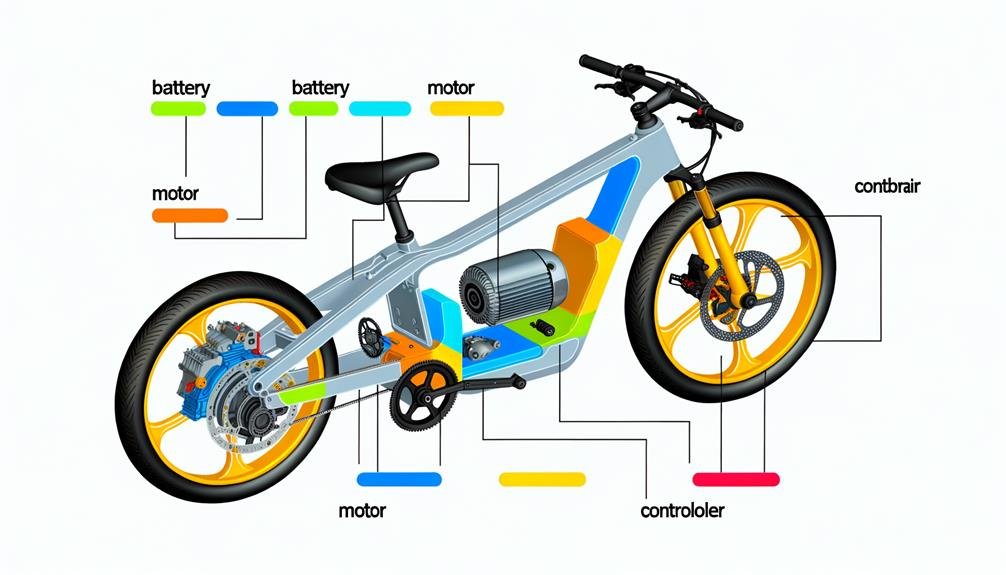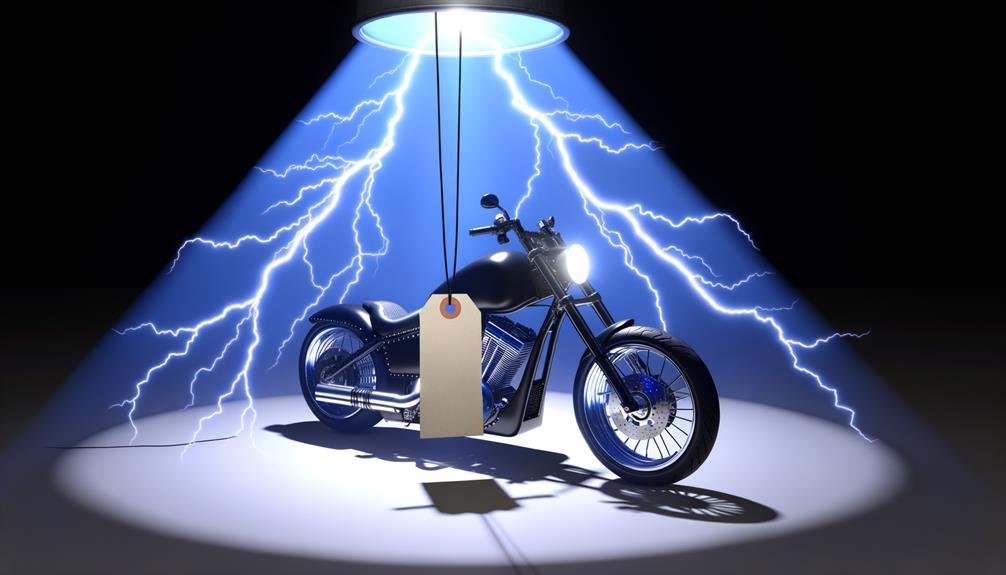Charles Miller is a veteran bike enthusiast with over 12 years of experience dealing with bikes as a mechanic. Despite immense love and expertise for...
The cost of an electric bike, often referred to as an e-bike, can be a complex subject to navigate due to the multitude of variables at play. The price can fluctuate significantly based on factors such as the brand reputation, motor power, battery capacity, and the specific style or type of e-bike.
Additionally, intrinsic aspects such as the quality of components, innovative design features, and the type of materials used in the construction of the bike can also heavily influence the final price tag.
This discussion aims to demystify these factors, providing a comprehensive overview of what goes into the pricing of an e-bike, thus equipping potential buyers with a clearer understanding of what they might expect to invest in their ideal electric bike.
- Key Takeaways
- Understanding Electric Bike Costs
- Factors Affecting E-Bike Prices
- Breakdown of E-Bike Components
- Battery Types and Their Influence on Price
- Assessing E-Bike Design and Cost
- Importance of Brand in E-Bike Pricing
- High-End Vs. Budget E-Bikes
- Cost of E-Bike Maintenance
- Future of Electric Bike Pricing
- Frequently Asked Questions
- Conclusion
Key Takeaways
- Factors affecting e-bike prices include the quality of the bike, specifications and design, frame material, battery size, and motor brand and location.
- Battery types, such as lithium-ion batteries and advanced battery technologies, can influence the price of an e-bike due to their cost and lifespan.
- The design elements of an e-bike, including quality, technical specifications, material choice, and brand reputation, can significantly impact its cost.
- The importance of the brand in electric bike pricing is notable, as established brands tend to charge more due to proven reliability, after-sales services, better components, warranty coverage, and better resale value.
Understanding Electric Bike Costs
Delving into the cost dynamics of electric bikes, it becomes apparent that various factors significantly shape the overall ownership cost. Understanding electric bike costs is crucial for potential buyers as prices can range from as low as $600 to a whopping $8,000, with the average price hovering around $1,500. These prices are influenced by aspects like motor type, battery size, and the bike's overall style.
However, the financial commitment to buy an eBike extends beyond the initial purchase. Maintenance expenses, including tune-ups and battery replacements, which can run between $75 to $120 and $350 to $800 respectively, equally contribute to the overall cost. Charging an electric bike also incurs an expense, although comparatively low, ranging from $1.28 to $4.28 per 1,000 miles.
Prospective buyers seeking a cheap electric bike solution should not overlook the value of strong manufacturer warranties. Most warranties offer one to two-year comprehensive coverage for bike components, helping to mitigate repair and maintenance costs. This crucial element can influence the decision to purchase, making the electric bike a more affordable, accessible option for those desiring the sense of belonging that comes from this burgeoning community.
Factors Affecting E-Bike Prices
Several key factors, namely quality, specifications, design, frame material, battery size, motor brand, and motor location, play pivotal roles in determining the overall price of an electric bike.
Quality is a significant determinant of e-bike prices. Higher-end models are made with precision and consistently deliver excellent performance, thus commanding higher prices. Specifications and design also play a central role. More advanced and aesthetically pleasing e-bike models tend to be priced higher.
The choice of frame material, from aluminum to carbon fiber, can significantly impact the price. Lighter and more durable materials usually command higher prices. The size of the battery is directly proportional to the bike's range, making larger batteries more expensive.
Motor brands also factor into the price. Renowned brands like Bosch and Shimano, known for their powerful motors, tend to cost more. Lastly, motor location affects the bike's performance and price, with mid-drive motors usually being more expensive than hub motors.
Understanding these factors affecting e-bike prices will help buyers find lower-priced options without compromising on their needs and preferences.
Breakdown of E-Bike Components

In analyzing the cost of electric bikes, a detailed examination of individual components such as the battery, motor, frame, brakes, and additional accessories reveals a significant influence on the overall price.
The battery, the powerhouse of the electric bike, can range between $300 to $1500 depending on its size, thereby directly impacting the e-bike's range and power.
Motor types, such as the hub-drive motor or the mid-drive motors, also play a crucial role in determining the cost. The brand and location of the motor influence the bike's acceleration and hill-climbing abilities.
Additionally, the frame material, being carbon or titanium, affects the e-bike's cost due to their lightweight durability and superior handling capabilities.
Further, the brake system, whether cable disc brakes or hydraulic disc brakes, significantly influences the overall cost. Hydraulic disc brakes offer better stopping power, but at an increased price.
Lastly, accessories like lights, racks, fenders, and suspension forks, while adding value to the electric bicycle, also contribute to its price.
This breakdown of components provides a comprehensive understanding of the factors influencing e-bike prices.
Battery Types and Their Influence on Price
The type of battery utilized in an electric bike plays a significant role in determining its price, with cost and lifespan being key influencing factors.
For instance, Lithium-ion batteries, while expensive, offer a longer lifespan and better performance, thereby increasing the overall cost of the e-bike.
It's also important to consider that advanced battery technologies, such as lithium-polymer or solid-state batteries, while offering superior performance and durability, can elevate the price even further.
Comparing Battery Costs
When evaluating the overall expenses of owning an electric bike, one must take into account the significant role that the type and size of the battery play in determining the price. The battery size can significantly impact the cost, with prices ranging from $300 to $1,500.
The price of reliable electric bikes varies based on factors such as motor type, battery size, and bike style.
Battery replacements add to the expenses, costing between $350 to $800 every 700 to 1,000 charges.
Best Cheap electric bikes often have smaller battery sizes, hence lower prices.
Mountain eBikes, road eBikes, and cruiser eBikes have different price ranges due to variations in battery types and sizes.
Understanding these factors helps in making a well-informed choice about electric bikes.
Lifespan's Impact on Price
Building upon the understanding of battery costs, it becomes crucial to consider how the type of battery and its lifespan influence the overall price of electric bikes.
Lithium-ion batteries, prevalent in 63% of electric bikes, strike a balance between performance and cost, causing a moderate impact on the price.
However, advanced lithium polymer batteries, found in higher-end models, have a larger capacity and longer lifespan but significantly increase the electric bike's price.
On the other hand, lead-acid batteries are cheap but heavy, making them suitable for budget-friendly models.
The longevity of the battery directly impacts the total cost of ownership of an electric bike, with longer-lasting batteries increasing the price electric bike considerably.
Assessing E-Bike Design and Cost

Understanding the cost of an electric bike involves examining not only the upfront purchase price, but also the design elements that contribute to that price. A detailed cost analysis is crucial in evaluating the value and performance of the e-bike relative to its cost.
Hence, we will explore and assess the various factors – from design attributes to material quality – that influence the overall cost of e-bikes.
E-Bike Design Elements
Delving into the realm of E-Bike design elements, one finds that the cost of these innovative vehicles is influenced by a unique blend of factors such as quality, technical specifications, material choice, and the reputation of the brand.
For the electric assist feature, the rear hub motor plays a significant role and is key to the E-Bike's performance.
Quality: Higher quality materials and components lead to long-lasting folding electric bikes, but these also increase the price.
Technical Specifications: A larger battery or a more powerful motor will provide enhanced performance but will also raise the cost.
Material Choice: Lightweight materials like aluminum or carbon fiber are costly but improve the bike's efficiency.
Brand Reputation: Established brands often charge more due to their proven reliability and after-sales services.
These E-Bike design elements are critical in cost assessment and must be considered when purchasing an E Bike.
Cost Analysis Breakdown
In analyzing the cost breakdown of electric bikes, it becomes evident that their pricing is intricately linked to a multitude of factors including the type of motor, battery size, bike style, and the overall quality of the design and specifications.
For instance, the cost of the rear hub motor significantly contributes to the 'how much price' query for an electric bike. The cost analysis breakdown further reveals that brands like Aventon and Rad Power Bikes, labeled as 'Best Electric' in some circles, offer affordable options while maintaining reliable quality. However, the pricing of premium e-bikes can be three to four times higher.
In essence, the cost of an electric bike is a reflection of its design intricacies, specs, and the brand's reputation in the market.
Importance of Brand in E-Bike Pricing
When evaluating the price of an electric bike, one cannot overlook the significant role the brand plays. Established and reputable brands often set their prices higher due to factors such as quality, innovation, and customer satisfaction. The importance of brand in e-bike pricing is a testament to the value they provide, often justifying their premium price tag.
A brand's reputation for reliability and customer satisfaction can significantly influence the price. Brands we've tested and found to be reliable often command higher prices.
The quality of components used in an electric bike is another factor. Premium brands typically use better components, which is reflected in the overall price.
The after-sales service, including warranty and customer support, can also affect the price. Established brands usually offer superior support, assuring customers of their purchase.
Resale value is another aspect worth considering. Well-known brands often have better resale values, making them a smarter long-term investment.
Hence, when pondering over 'how much price electric bike', it's crucial to consider the brand's role.
For a comprehensive understanding, check out our 'Best E-Bike Brands' guide, which provides an in-depth analysis of various brands and their offerings.
High-End Vs. Budget E-Bikes

Building on the brand's influence on e-bike pricing, it is imperative to explore the stark distinctions between high-end and budget e-bikes, an aspect that further complicates the pricing equation. High-end vs. budget e-bikes can significantly differ in their features, performance, and, consequently, their prices.
| Factors | High-End E-Bikes | Budget E-Bikes |
|---|---|---|
| Price | $6000-$8000 | Under $2000 |
| Bike Style | Best mountain electric bikes, road e-bikes | Urban commuting e-bikes, leisure e-bikes |
| Motor Type | High-performance mid-drive motors | Economical hub motors |
| Material of the Frame | Carbon fiber, high-grade aluminum | Steel, lower grade aluminum |
| Battery Size | Larger capacity (up to 1000Wh) | Smaller capacity (up to 500Wh) |
High-end e-bikes typically feature superior components, advanced technology, and more powerful motors, justifying their higher price. They often fall under the 'Three Classes' of e-bikes, offering varying degrees of pedal-assist and throttle-based propulsion. Budget e-bikes, in contrast, are more economical, often featuring hub motors and smaller batteries, making them suitable for shorter commutes and leisurely rides. Consequently, when considering 'how much price electric bike?', the choice between high-end and budget e-bikes significantly affects the answer.
Cost of E-Bike Maintenance
While considering the overall cost of owning an electric bike, it's essential to factor in maintenance expenses, which can vary from routine tune-ups and tire replacements to significant costs like battery replacement and charging. The cost of e-bike maintenance should not be underestimated, especially when it comes to enjoying your electric ride in the long term.
To ensure your first bike remains in top condition, make sure to consider the following expenses:
- Routine tune-ups at your local shop can range between $75 and $120.
- Tire replacements usually cost around $30 each.
- Battery replacement is a significant cost, typically needed every 700 to 1,000 charges, and can range from $350 to $800.
- Charging the e-bike can cost between $1.28 to $4.28 per 1,000 miles.
Additionally, understanding and performing basic maintenance tasks can help reduce these costs. Furthermore, a strong manufacturer's warranty, typically offered for one to two years, can also significantly lower your maintenance costs.
Therefore, while considering the cost of e-bike maintenance, it's crucial to be well-informed and prepared for these expenses.
Future of Electric Bike Pricing

Having taken into account the maintenance costs associated with electric bikes, it is equally important to shed light on the evolution of their purchase price, a crucial factor that shapes the future of this burgeoning market. In the spectrum of electric mountain bikes to folding e-bikes, the price range is wide, reflecting the diversity of the e-bike community and their varying needs.
The future of electric bike pricing is expected to follow a two-pronged trajectory. On one hand, the popularity of lower-cost e-bikes for short trips and leisurely activities is likely to persist, thus encouraging manufacturers to enhance their offerings in this segment. Meanwhile, the demand for premium e-bikes, such as the best mountain models, is also anticipated to rise, driven by the desire for superior performance and advanced features.
The pricing strategy will, of course, depend on several factors, including the cost of components, manufacturing expenses, and market demand. However, it is important to remember that the 'how much price electric bike' question should also take into account the overall ownership costs, including maintenance and charging costs, as well as the warranty coverage. These factors collectively will shape the future of electric bike pricing.
Frequently Asked Questions
How Much Does a Good Electric Bike Cost?
A good electric bike typically costs between $1,500 and $8,000, factoring in bike financing options and electric bike insurance. Customization, ebike maintenance, and sustainability aspects may also influence the overall cost.
What Is the Price of an Electric Bicycle?
Electric bicycle prices vary greatly, influenced by factors such as motor type, battery size, and style. Considerations extend beyond initial cost, encompassing ebike maintenance, financing options, insurance, depreciation, and accessories pricing.
Which Electric Bike Is Best to Buy?
Choosing the best electric bike involves a thorough comparison of bike features, reading e-bike brand reviews, selecting the appropriate e-bike size, considering necessary accessories, and understanding maintenance requirements for long-term performance and reliability.
How Long Do Ebike Batteries Last?
Like a diligent worker, an ebike battery lifespan ranges 2-4 years, contingent on charging frequency and battery technology. Regular maintenance can prolong its life, reducing battery replacement costs. However, eventual replacement is inevitable.
Conclusion
In conclusion, the cost of electric bikes, influenced by factors such as brand, motor type, battery size, and bike style, varies widely.
High-end models, with their superior specifications and design, command higher prices, while budget options offer affordability.
The continuous evolution in e-bike technology and components may also impact future pricing.
Therefore, potential buyers must carefully assess these aspects to make an informed purchase, understanding that initial costs may be offset by lower maintenance expenses and increased longevity.

Charles Miller is a veteran bike enthusiast with over 12 years of experience dealing with bikes as a mechanic. Despite immense love and expertise for his Tacoma, he rides his Trek Ebike more. Anytime you meet him, you’ll either hear him talking about Bikes, or writing about all things bikes and cars on this blog.
More Posts


